By David Pan · Friday, September 25, 2020 Telos 192 (Fall 2020): Truth and Power is now available for purchase in our store. Individual subscriptions to Telos are also available in both print and online formats.
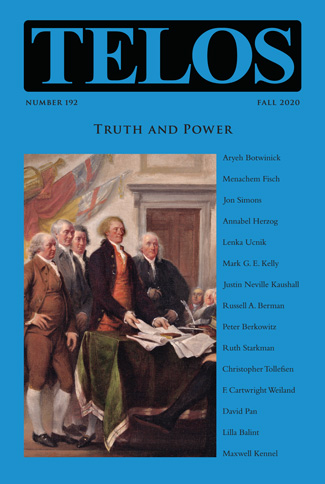 There is a strong temptation to oppose the idealism of truth to the realism of power in order to criticize and turn away from politics as a base pursuit. Science, facts, and ideals are cited as the objective truths that so often are ignored in favor of ideology, lies, and self-interest by those who wield power. Yet this opposition between truth and power can itself become a dubious tactic, as it is often the speaker who seeks to define an opinion as truth. This situation is complicated by the circumstance that there are three forms of truth that are often merged in such discussions. There is a strong temptation to oppose the idealism of truth to the realism of power in order to criticize and turn away from politics as a base pursuit. Science, facts, and ideals are cited as the objective truths that so often are ignored in favor of ideology, lies, and self-interest by those who wield power. Yet this opposition between truth and power can itself become a dubious tactic, as it is often the speaker who seeks to define an opinion as truth. This situation is complicated by the circumstance that there are three forms of truth that are often merged in such discussions.
First, there are natural scientific truths that even autocrats and totalitarians do not seek to deny, as they are the source of the technological tools that can support any attempt to maintain power. Here, there is certainly no conflict between truth and power. Not only does political power depend on technological achievement, but natural scientific facts cannot be covered up by lies and ideology for long. Consequently, political actors must pay attention to natural scientific and technical knowledge, even if they then instrumentalize it in different ways.
Continue reading →
By David Pan · Monday, June 15, 2020 Telos 191 (Summer 2020): Going Viral is now available for purchase in our store. Individual subscriptions to Telos are also available in both print and online formats.
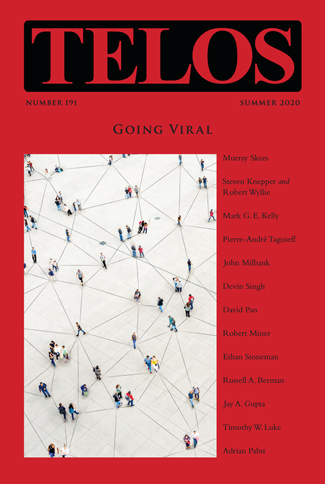 While “going viral” has taken on a new meaning by recuperating an old one, it is the virtual experience that seems to be more enduring. Not only has the pandemic sped up the shifting of human activity onto virtual platforms, but the viral dynamics of social media seem set to outlast the microbial versions: it has turned out to be easier to lock down the Wuhan virus than President Trump’s Twitter feed. Yet in both cases, it is unclear whether it is the actual spread or the fear that is the greater danger. For this fear leads to the call for more authoritarian measures, whether this means censoring Twitter posts or locking down the population. But if viral spread leads to the reassertion of sovereignty, we also come to realize that the freedoms we have taken for granted are in fact the result of a curated space, in which the rules for interaction have always formed the hidden framework within which our lives have unfolded. As these framing conditions come into focus during the crisis, we have the opportunity to reimagine them in such a way as to retrieve sovereignty not as a kind of authoritarian reaction but as an understanding of how our values must inform the boundaries we set. This issue of Telos considers how the experience of going viral has come to dominate our political life as well as how our reflection on this process can free us to consider the alternatives. While “going viral” has taken on a new meaning by recuperating an old one, it is the virtual experience that seems to be more enduring. Not only has the pandemic sped up the shifting of human activity onto virtual platforms, but the viral dynamics of social media seem set to outlast the microbial versions: it has turned out to be easier to lock down the Wuhan virus than President Trump’s Twitter feed. Yet in both cases, it is unclear whether it is the actual spread or the fear that is the greater danger. For this fear leads to the call for more authoritarian measures, whether this means censoring Twitter posts or locking down the population. But if viral spread leads to the reassertion of sovereignty, we also come to realize that the freedoms we have taken for granted are in fact the result of a curated space, in which the rules for interaction have always formed the hidden framework within which our lives have unfolded. As these framing conditions come into focus during the crisis, we have the opportunity to reimagine them in such a way as to retrieve sovereignty not as a kind of authoritarian reaction but as an understanding of how our values must inform the boundaries we set. This issue of Telos considers how the experience of going viral has come to dominate our political life as well as how our reflection on this process can free us to consider the alternatives.
Continue reading →
By David Pan · Monday, March 16, 2020 Telos 190 (Spring 2020): Economy and Ecology: Reconceiving the Human Relationship to Nature is now available for purchase in our store. Individual subscriptions to Telos are also available in both print and online formats.
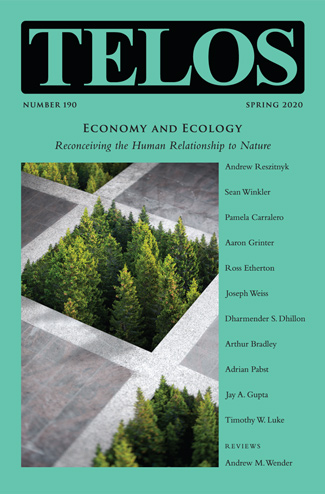 Our human relationship to nature defines our economic life. As Marx articulated in the 1844 manuscripts, labor involves an engagement with nature in order to fulfill human ends, the working up of nature as an “inorganic body.” Consequently, the world of work and that of the environment are really two aspects of our relationship to nature, and the shift in academic interest from economy to ecology as the burning issue of the day does not represent any real change in perspective. On a fundamental level, economy is ecology and vice versa. Thus, the issue of climate change is primarily one about the energy structure of our economy. If that structure before the Industrial Revolution boiled down to the way in which we were cutting down our forests, today the issue is how fossil fuels are leading to climate change. The other global natural disaster of our day, the coronavirus, has arisen as a consequence, first, of our treatment of wild animals as food and, second, of economic globalization, whose movements have established the pathways for the rapid spread of viruses. Our human relationship to nature defines our economic life. As Marx articulated in the 1844 manuscripts, labor involves an engagement with nature in order to fulfill human ends, the working up of nature as an “inorganic body.” Consequently, the world of work and that of the environment are really two aspects of our relationship to nature, and the shift in academic interest from economy to ecology as the burning issue of the day does not represent any real change in perspective. On a fundamental level, economy is ecology and vice versa. Thus, the issue of climate change is primarily one about the energy structure of our economy. If that structure before the Industrial Revolution boiled down to the way in which we were cutting down our forests, today the issue is how fossil fuels are leading to climate change. The other global natural disaster of our day, the coronavirus, has arisen as a consequence, first, of our treatment of wild animals as food and, second, of economic globalization, whose movements have established the pathways for the rapid spread of viruses.
Continue reading →
By David Pan · Monday, September 9, 2019 Telos 188 (Fall 2019): Theology and World Order is now available for purchase in our store. Individual subscriptions to Telos are also available in both print and online formats.
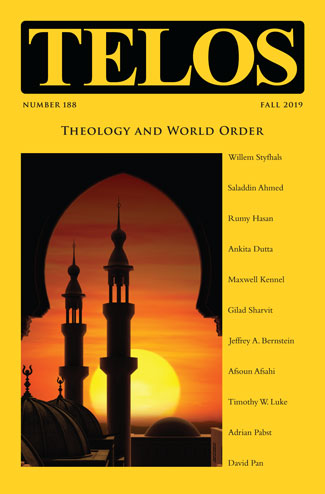 It would be naive to consider the question of global political order without engaging in debates about theology. Not only has it become clear that religious conflicts drive political ones, the very attempt to move “beyond” religion must be understood in terms of its theological meaning. The postsecular turn has not meant a return to religion so much as a realization that secularization was never a turn away from religion in the first place but rather itself a specific theological alternative among many. Accordingly, if our deepest political conflicts arise as consequences of theological disputes, we must address theology directly in order to get to the roots of major conflicts. Not only clear cases, such as conflicts between Israelis and Palestinians or between Shiite and Sunni Muslims, but also those between the United States and China revolve around theological issues that shape political and military conflict. Yet, our current approaches rely on political scientific and military calculations that have not yet been able to evaluate theology as a key and deciding factor in such conflicts. As the U.S. military and intelligence agencies debate the threat that Islamic State poses in Afghanistan, for instance, a key consideration should be the character and prospects of Islamic State’s theology, as well as the broader question of the role of theology in deciding political conflict. This issue of Telos engages in this discussion by considering how conceptions of world order arise from specific theologies. It would be naive to consider the question of global political order without engaging in debates about theology. Not only has it become clear that religious conflicts drive political ones, the very attempt to move “beyond” religion must be understood in terms of its theological meaning. The postsecular turn has not meant a return to religion so much as a realization that secularization was never a turn away from religion in the first place but rather itself a specific theological alternative among many. Accordingly, if our deepest political conflicts arise as consequences of theological disputes, we must address theology directly in order to get to the roots of major conflicts. Not only clear cases, such as conflicts between Israelis and Palestinians or between Shiite and Sunni Muslims, but also those between the United States and China revolve around theological issues that shape political and military conflict. Yet, our current approaches rely on political scientific and military calculations that have not yet been able to evaluate theology as a key and deciding factor in such conflicts. As the U.S. military and intelligence agencies debate the threat that Islamic State poses in Afghanistan, for instance, a key consideration should be the character and prospects of Islamic State’s theology, as well as the broader question of the role of theology in deciding political conflict. This issue of Telos engages in this discussion by considering how conceptions of world order arise from specific theologies.
Continue reading →
By David Pan · Monday, June 17, 2019 Telos 187 (Summer 2019) is now available for purchase in our store. Individual subscriptions to Telos are also available in both print and online formats.
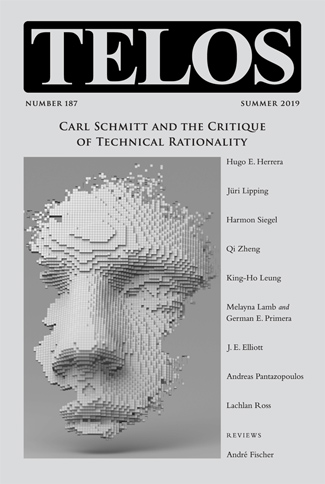 After a modern era of technological progress that has led humans to believe in their increasing ability to control nature, we are reaching a point at which this power on a small scale has given way to increasing uncertainty and uncontrollability on the large scale. Not only are the specific effects of climate change difficult to predict and control, the only mechanisms available for such control—agreement and cooperation across national and cultural divides—are not the stuff of engineering but of politics. So with every technological advance that promises to bring us more control over our lives, we as a species are facing ever greater risks and uncertainties. The question concerning technology has become the unpredictability and uncontrollability of its development itself. The key difficulty is a problem of a tension between community or national interests and species-wide interests. While there might be an ethical imperative on a species-wide level to exercise self-restraint in pursuing dangerous technologies such as nuclear weapons, gene manipulation, or coal-fired power plants, such self-restraint could very well lead to the decline or even annihilation of the group that exercises it. The path forward will not be revealed by new technological advances, which can easily create more problems than they solve, but through the development of new ethical, political, and affective frameworks by which people understand themselves and their connections to the rest of the world. This issue of Telos, devoted to Carl Schmitt and the critique of technical rationality, investigates the ways in which Schmitt’s critique moved him toward ways of considering law, politics, and human history as fundamentally uncertain movements, requiring strategies that accept such unpredictability even as we try to intervene in our historical development as a species. After a modern era of technological progress that has led humans to believe in their increasing ability to control nature, we are reaching a point at which this power on a small scale has given way to increasing uncertainty and uncontrollability on the large scale. Not only are the specific effects of climate change difficult to predict and control, the only mechanisms available for such control—agreement and cooperation across national and cultural divides—are not the stuff of engineering but of politics. So with every technological advance that promises to bring us more control over our lives, we as a species are facing ever greater risks and uncertainties. The question concerning technology has become the unpredictability and uncontrollability of its development itself. The key difficulty is a problem of a tension between community or national interests and species-wide interests. While there might be an ethical imperative on a species-wide level to exercise self-restraint in pursuing dangerous technologies such as nuclear weapons, gene manipulation, or coal-fired power plants, such self-restraint could very well lead to the decline or even annihilation of the group that exercises it. The path forward will not be revealed by new technological advances, which can easily create more problems than they solve, but through the development of new ethical, political, and affective frameworks by which people understand themselves and their connections to the rest of the world. This issue of Telos, devoted to Carl Schmitt and the critique of technical rationality, investigates the ways in which Schmitt’s critique moved him toward ways of considering law, politics, and human history as fundamentally uncertain movements, requiring strategies that accept such unpredictability even as we try to intervene in our historical development as a species.
Continue reading →
By David Pan · Monday, March 18, 2019 Telos 186 (Spring 2019) is now available for purchase in our store. Individual subscriptions to Telos are also available in both print and online formats.
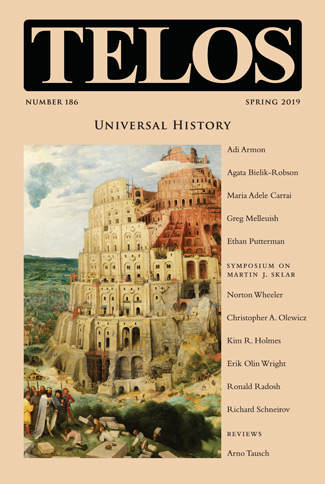 This issue is devoted to the question of universal history and is based in part on a 2015 Telos-Paul Piccone Institute conference organized by Greg Melleuish. As this event suggested, universal history today imagines the convergence of humanity around a single trajectory of capitalist technological progress coupled with the defense of liberal rights. But as much as technology has increasingly linked the world into a single movement of history, we cannot say the same about liberal rights. Rather than pointing us toward the liberal light at the end of the historical tunnel, world politics seems to be casting us into the blazing arena of the “clash of civilizations” presaged by Samuel Huntington, with different regions of the world—Africa, America, Asia, Europe, the Muslim world—increasingly at odds, each region with a dominant civilization pursuing its own cultural and political hegemony. This divergence between a materialist unity of development and a cultural fragmentation frames the problem of universal history. This issue is devoted to the question of universal history and is based in part on a 2015 Telos-Paul Piccone Institute conference organized by Greg Melleuish. As this event suggested, universal history today imagines the convergence of humanity around a single trajectory of capitalist technological progress coupled with the defense of liberal rights. But as much as technology has increasingly linked the world into a single movement of history, we cannot say the same about liberal rights. Rather than pointing us toward the liberal light at the end of the historical tunnel, world politics seems to be casting us into the blazing arena of the “clash of civilizations” presaged by Samuel Huntington, with different regions of the world—Africa, America, Asia, Europe, the Muslim world—increasingly at odds, each region with a dominant civilization pursuing its own cultural and political hegemony. This divergence between a materialist unity of development and a cultural fragmentation frames the problem of universal history.
Continue reading →
|
|
 There is a strong temptation to oppose the idealism of truth to the realism of power in order to criticize and turn away from politics as a base pursuit. Science, facts, and ideals are cited as the objective truths that so often are ignored in favor of ideology, lies, and self-interest by those who wield power. Yet this opposition between truth and power can itself become a dubious tactic, as it is often the speaker who seeks to define an opinion as truth. This situation is complicated by the circumstance that there are three forms of truth that are often merged in such discussions.
There is a strong temptation to oppose the idealism of truth to the realism of power in order to criticize and turn away from politics as a base pursuit. Science, facts, and ideals are cited as the objective truths that so often are ignored in favor of ideology, lies, and self-interest by those who wield power. Yet this opposition between truth and power can itself become a dubious tactic, as it is often the speaker who seeks to define an opinion as truth. This situation is complicated by the circumstance that there are three forms of truth that are often merged in such discussions. 






